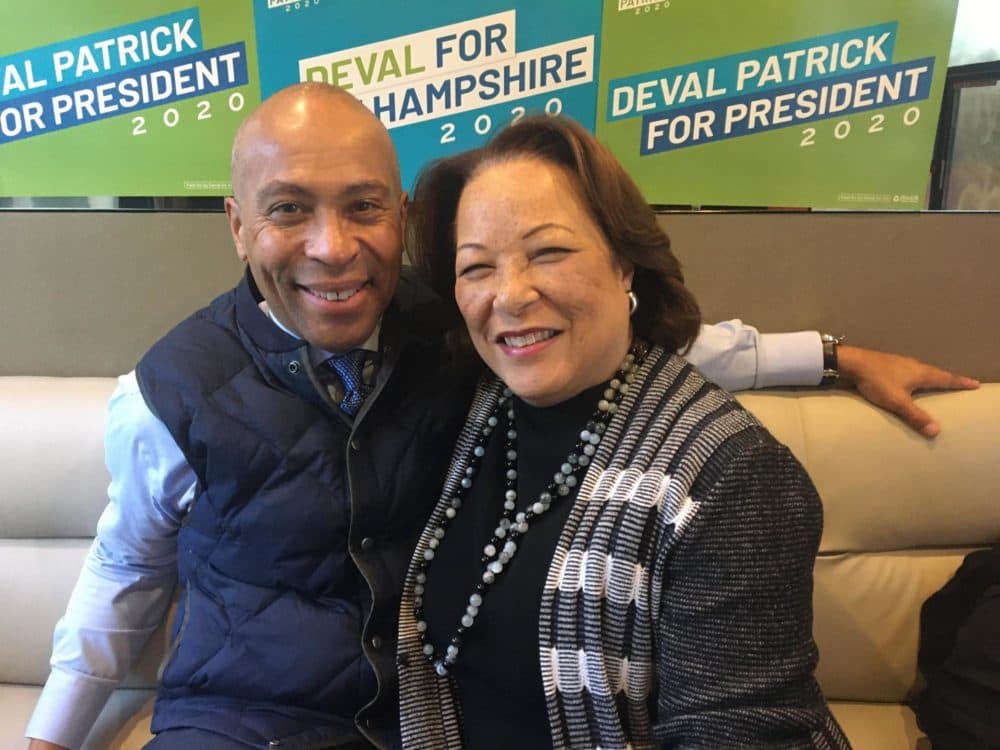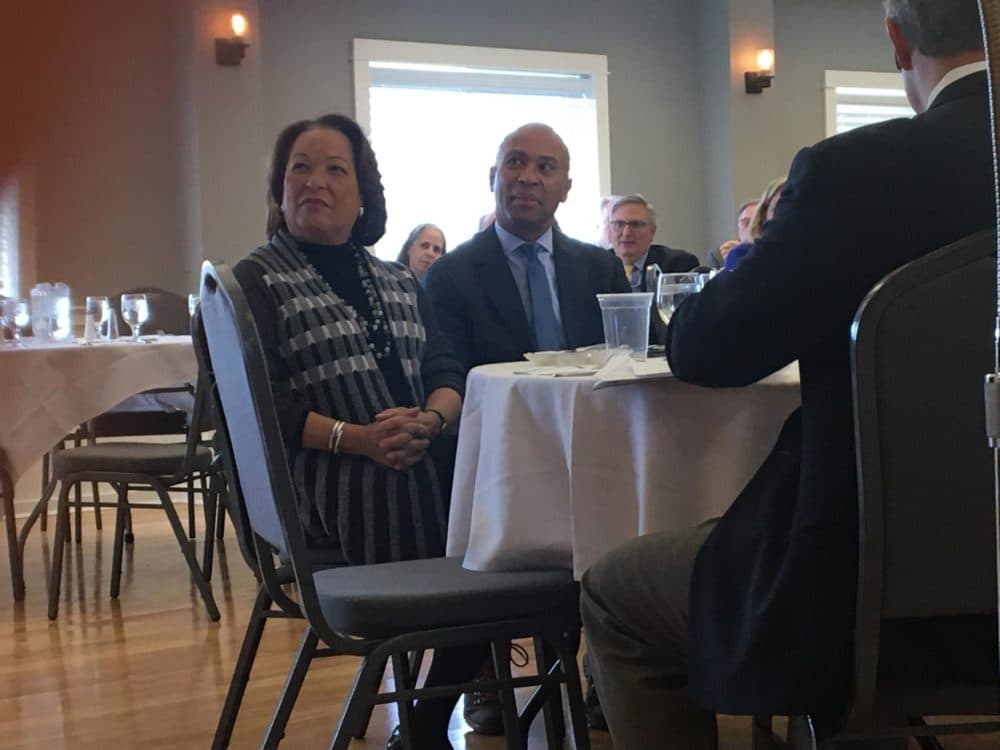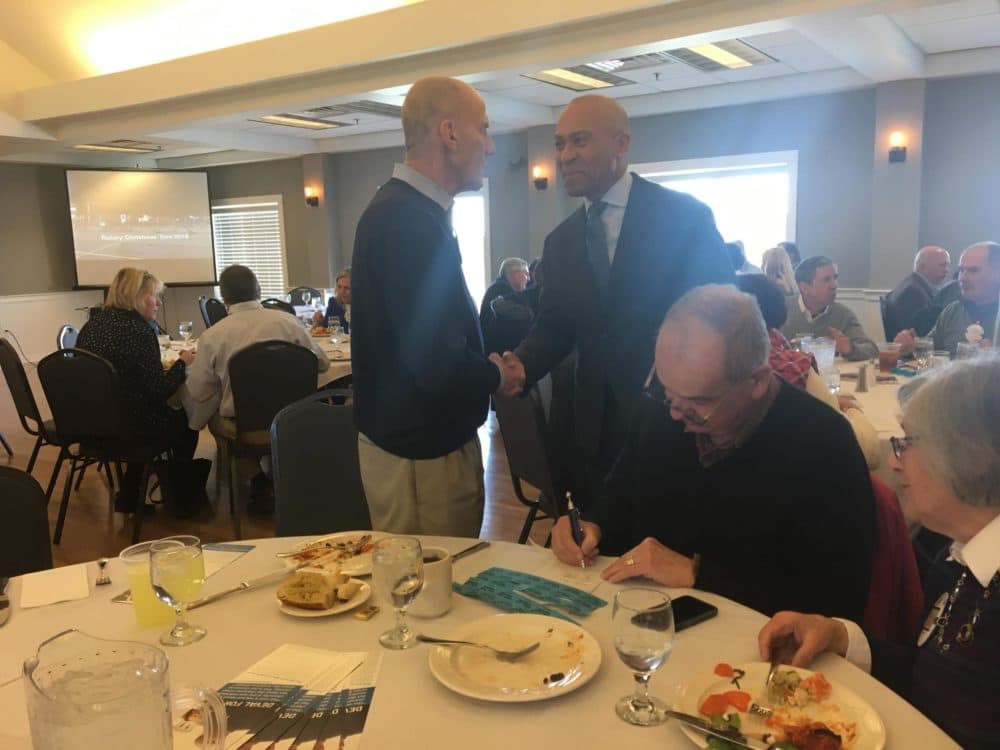Advertisement
During Presidential Campaign, Deval And Diane Patrick Bring Mental Health 'Into The Open'

Presidential campaigns aren’t for the faint of heart. On a recent afternoon in Greenland, New Hampshire, Diane and Deval Patrick were just beginning a six-day bus tour of the state.
The former Massachusetts governor fielded questions from the Portsmouth Rotary Club. Then he started looking for food.
"They do not feed me," he joked about his staff, as he tore open a boxed lunch in the back of his campaign bus. "Two pieces of bread and pasta."
But Diane Patrick, who's no newbie to campaigning, is taking care of herself.
"That’s why I had the salad. I wasn't sure what was going to end up on the bus," she quipped.
Diane Patrick is actively campaigning for her husband, meeting with voters here in New Hampshire and South Carolina.

But, as Deval Patrick told a crowd of supporters last month in Dorchester, his wife had a different perspective when he ran for office the first time, in 2005 and 2006.
"Diane was a reluctant first lady," he said. "There was a really tough time at the very beginning of that first rocky term.... She was overwhelmed by all of it. By the meanness and the nastiness, some of it brought on by my own clumsy start and some of it just because that's what we do. That's what politics has often become."
There were few boundaries protecting her after he entered politics, the former governor explained. On top of that, Diane Patrick is a private person.
Just as her husband had never before held elected office, she never had to withstand the public scrutiny of being a politician’s wife. And she had her own career. She was a partner at Ropes & Gray, a large international law firm.
“It’s what lifted me: serving my clients, working with my colleagues. And I didn’t want to stop that,” Diane Patrick said during an interview on the bus.
Advertisement
She didn’t give it up, but the long, uphill 2006 campaign wore her out.
"What happened was I was, first of all, exhausted," she said.
Not only from the campaign, but from what she read: news stories criticizing her for hiring a staff member to assist in her duties as first lady, and attacking her husband for buying a Cadillac — coverage she has previously called "racist." And then there were the online comments.
“They were ugly and they were hurtful. And our children were hurt by it. Our whole family was in pain. And I felt I carried all of that," she said. "I just, at some point thought, I don't know that I can go on like this. And that's when I knew that I needed some help.”
Less than two months after her husband took office, Diane Patrick was admitted to McLean, a psychiatric hospital.

This was not the first time she had experienced depression and anxiety.
"It was just the first time I had experienced it so deeply and so painfully," she said.
In his memoir, "A Reason to Believe," Deval Patrick wrote that Diane was admitted to the hospital under a false name. And, at first, he chose to sneak in at night.
“We'd be met by security from the hospital. And I think the first time I was brought up a back stair. I remember sitting with your doctor in the stairwell, getting a briefing," he said on the bus, turning to his wife. "And after a couple of days it was Diane who said, ‘This makes no sense. You know, I'm not ashamed. I just don't feel well.’”
And that’s when, against the doctors’ advice, they issued a statement.
“Saying, you know, Diane is managing anxiety and depression,” said the former governor. “We asked for the respect of the media and the general public. And... the restraint of the media was beautiful. And the response of the public was magnificent.”
Diane Patrick got better and credits great health care for helping her.
And over time, she embraced her new role.
“I found I had a voice that I could use for public good,” she said. “And so I began to feel like I was part of something important.”
She advocated for better policies to address domestic abuse and sexual violence — and mental health. Deval Patrick said that helped her heal.
“Thousands of people responded to that in a positive way by saying, you brought this out of the shadows for all of us,” he said. “And then, the people we meet who say to me or to her, in often very private ways, 'You saved my life.' That’s no small thing.”
Today, as a presidential candidate, Deval Patrick is calling for expanded access to mental health care, and for removing the stigma of mental illness. He wants health providers and employers to do a better job talking about mental health.

But the former governor is polling below 1 percent in New Hampshire. He only entered the presidential race just a little over three months ago. As he explained to supporters, that's because Diane Patrick had been diagnosed with cancer.
"That’s exactly the kind of thing that brings you to the ground," he told supporters in Dorchester. "So we stepped back. That felt like the right thing to do. I still think it’s the right thing to have done."
Diane Patrick is healthy now. She's also retired from the law firm, and no longer reluctant to campaign.
Being open about her cancer diagnosis is similar to her approach to mental health.
“It has to be brought out into the open,” she said. “People have to confront it. Your family, your friends, your employer. We all need to rally around people that have mental health issues. And if we keep it secret, no one gets better.”
She said if she gets to the White House, being open about mental health issues will be at the top of her agenda.
WBUR’s Steve Brown contributed audio to this report.
This story is a production of the New England News Collaborative and was originally published by New England Public Radio.
This segment aired on February 9, 2020.